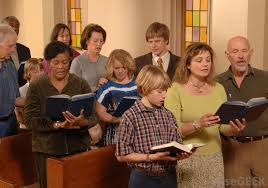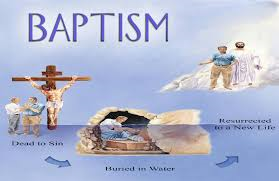Has God Given Us Instructions That We Must follow ?
Today we’re going to look at three different ways that God gives us instructions within the bible. Those three ways are by direct command, by example, and by what we must necessarily infer based upon what God has implied in His word. Do you believe that God has given us SPECIFIC instructions which we must obey in order to be pleasing to Him? Do you view the bible as being the source of those instructions, and that God requires us to obey them? Many people don’t view the bible that way at all.
Many people believe that the bible is simply a book of noteworthy sayings and examples. And that while these sayings and examples do serve the common good of mankind, and that they well may exemplify a very good way of living, they are NOT in any way, commands from God that MUST be obeyed. Well, this article is not intended for anyone who simply thinks the bible is a good book, and that it does NOT contain commands from God that MUST be obeyed. This article is intended for people who believe that the bible is actually the word of God, and that the bible DOES in fact set forth commands that we all MUST obey if we are to be pleasing to God, and if we would have any hope of finding eternal salvation for our souls.
However, even though this article is intended for those who DO view the bible as the authoritative word of God, I still want to urge you to read on, even if you do not hold this view. With that being said, allow me to go forth with a discussion of HOW God has set forth His commands for us to follow, and by which we can be granted salvation from sin.
God’s Instruction Book
If God has indeed provided us with a book that is our “instruction book” to find our way to heaven, then we must be able to properly understand which, of all the words recorded in the bible, are the actual “instructions” that we must follow. And on the other hand, we must be able to understand, which of the many words of the bible, are recorded to serve some other purpose.
For example, many of the words in the bible tell us of the glory and power of God, and of God’s nature and of His eternal existence. “For since the creation of the world, His invisible attributes, his eternal power, and His divine nature, have been clearly seen, by what has been made…” Rom 1:18. But while all of these facts are of great value to us, they don’t serve as “instructions” that we need to follow. They are indeed FACTS that we must believe, but they don’t serve as instructions of any sort.
Now you might say; Well, “common sense” will tell us which words are giving us an instruction, and which words are simply disclosing facts to us. And you would be right to a very high degree. But there has always been an ongoing discussion, and sometimes a debate, and sometimes unfortunately, downright bitter contention, as to what words of the bible are actual commands for us to follow, and which are not.
Let me give you some examples of matters of discussion.

#1..
Some people contend that a congregation has no right to own a building in which to assemble in and worship God in. While others contend that God gave us the RIGHT to own a building to assemble in, when He gave us the command to assemble. And so to justify owning a building, one would go to specific verses of scripture to show what God has IMPLIED when He gave us the command to assemble.
#2.
Some people contend that there is no prescribed “pattern” that our public worship of God must follow, in order to please God. While others contend that the bible does authorize ONLY certain things to be done in the public worship assembly, and that to do anything else, is to go beyond God’s word on the subject, and is consequently “wrong” and sinful to do. And so to defend SPECIFIC practices, we would have to search for specific commands on the subject, or at least be able to show specific examples of the first century Christians worshipping in a specific manner.
Now a specific example would certainly atv least AUTHORIZE that a specific act is acceptable to God, but that example may very well also IMPLY that the specific act is not ONLY acceptable, and that we have God’s permission to do it, but that God REQUIRES us to perform that act, every time we assemble for worship. It would depend upon the example and what the bible has said in recording that example for us.
#3..
Some people contend that we should partake of the Lord’s Supper, EVERY first day of the week, while others believe it’s fine to partake of it once a month, or once per quarter, or even once a year. And so again, we would need to find a direct command from God on the subject, and also find all the examples given in the bible, to enable us to put together the complete picture of what God has taught on the subject, and maybe even see if God’s words have inferred something else also.
God’s examples recorded in the bible will surely authorize some things, or they may imply strict adherence, or they may restrict in some way, the things that we’re allowed to do.
There’s many other topics such as those above
Now those things that I mentioned, are simply examples of the kind of things that people disagree on when it comes to what the bible has commanded us to do, as compared to what it has authorized us to do but not required us to do. And also what the bible has forbidden us to do, or not forbidden us to do. What it all really boils down to is how we interpret what constitutes a command, and what constitutes simply an example that we learn from, but that we don’t have to follow specifically. There’s many other topics of discussion also, but we obviously can’t discuss every topic, or we’d be here for an eternity. But this article will serve to give us a logical and rational way of determining, no matter what the topic is, exactly how we can make a proper judgment, of what we CAN do, and what we MUST do, and what we must NOT do, based on what God’s word has said. And all this will be based on sound reasoning.

After all, we are instructed by God, in Isaiah 1:18, “Come now, let us reason together, says the Lord.” Is that a suggestion, or is that a command? Is God simply suggesting that it might be of value to come together with Him and reason about His word? Or is God commanding us, that it our obligation to read His word, and learn all that He has said, and use our ability to reason, to determine what He would have us to do? I think it’s obvious that God demands that we reason together with Him! He’s not just telling us to reason together among ourselves. We don’t have the knowledge or the understanding to do that. We MUST use HIS word as the basis for our reasoning. Remember, “As the heavens are higher than the earth, so are My ways higher than your ways, and My thoughts are higher than your thoughts.” These are GOD’S words from Isaiah 55:9.
Necessary Inference

As I’ve already mentioned, one area that we’ll get into is that of a “necessary inference”. Now that may not be something that you’re real familiar with, so I’ll explain it a little further. Sometimes when God says something, or when one of His inspired apostles say something, along with what they specifically say, they might also IMPLY something in addition to what they’ve specifically said. Let me give you a simple example of this…
Jesus said in Rev 2:7, “To him who overcomes, I will grant to eat of the tree of life, which is in the paradise of God.” So there’s a straightforward statement, but it also implies something in addition to what was specifically said. The implication is that if one DOES NOT overcome, then Jesus will NOT grant to him to eat of the tree of life, in the paradise of God. That’s pretty easy to understand isn’t it? So that’s how God can teach us by what we call a “necessary inference”. It’s “necessary to infer” that since the one who overcomes WILL be granted to eat of the tree of life, then it is just as true, that the one who does NOT overcome, will NOT be granted to eat of the tree of life. So God implies that truth, and we must correctly infer the same. And so it’s a “law” of God, that if you don’t overcome, you will not go to heaven. And that “Law” is taught by “necessary inference”.
 Let’s look at one more example of a necessary inference. This example will actually be dealing with an area of great controversy among people who profess to be Christians. Listen to the words of Mark 16:15-16, This is Jesus speaking, “And He said to them; Go into all the world and preach the gospel to all creation. He that has believed and has been baptized, shall be saved.” Jesus has specifically stated that “He who has believed and has been baptized, shall be saved”. So those two things, believing and being baptized, are obviously conditions that must be met in order to be saved. Jesus said it, so it must be true. But then Jesus went on to say, “..But he who has disbelieved shall be condemned.” So people, in their own “wisdom”, will say; Jesus didn’t SAY that if we haven’t been baptized, we’ll be condemned. He only said that if we have disbelieved, we’ll be condemned. Therefore we will NOT be condemned just because we haven’t been baptized.
Let’s look at one more example of a necessary inference. This example will actually be dealing with an area of great controversy among people who profess to be Christians. Listen to the words of Mark 16:15-16, This is Jesus speaking, “And He said to them; Go into all the world and preach the gospel to all creation. He that has believed and has been baptized, shall be saved.” Jesus has specifically stated that “He who has believed and has been baptized, shall be saved”. So those two things, believing and being baptized, are obviously conditions that must be met in order to be saved. Jesus said it, so it must be true. But then Jesus went on to say, “..But he who has disbelieved shall be condemned.” So people, in their own “wisdom”, will say; Jesus didn’t SAY that if we haven’t been baptized, we’ll be condemned. He only said that if we have disbelieved, we’ll be condemned. Therefore we will NOT be condemned just because we haven’t been baptized.
Remember that verse that we just read from Isaiah 1:18, “Come now, let us reason together, says the Lord” ? Well, the example that I just gave, is an example of people reasoning all by themselves, about what God has NOT said. God told us to reason together with HIM, with His word. So let’s look at what He DID say. If a person has believed, and if a person has been baptized, then that person shall be saved. That’s no guarantee that they’ll REMAIN saved, but for now, they’ll be saved. But if they have NOT believed, they’ll be condemned. Now there’s an obvious IMPLICATION there, made by God Himself. God is obviously implying that if you haven’t believed, then you obviously won’t obey His command to be baptized either. Nor will you obey ANY command of His, because you don’t believe what He says in the first place! So there’s an obvious implication there, that we can’t deny, and still think that we’re being “reasonable” to any degree. And that implication is, that if you have NOT been baptized, then you will NOT be saved. And what’s more, is the fact that if we haven’t BELIEVED, then it wouldn’t matter if we were baptized or not, because Jesus Himself said, “If you believe NOT that I am he, you will die in your sins!” John 8:24. That’s pretty emphatic, isn’t it? If we don’t believe, then it doesn’t matter what else we do or don’t do. If we don’t believe that Jesus is the Christ, the Son of the living God, then we’re LOST! And we’re going to stay lost, until we DO believe. That’s all there is to it.
There’s plenty of verses of scripture that tell us rather directly that baptism is necessary for salvation. For instance Acts 2;38, “Repent and let each one of you be baptized, in the name of Jesus Christ, for the forgiveness of your sins.” And Acts 22;16, “And now, why do you delay? Arise and be baptized and wash away your sins, calling on His name..” And 1 Pet 3;21, “And corresponding to that, baptism now saves you! Not the putting away of the dirt of the flesh, but the appeal to God, from a good conscience, through the resurrection of Jesus Christ.”
And besides all those verses, the verse that we were looking at, teaches us by a NECESSARY inference, that if we are NOT baptized, we will NOT be saved. “He that has believed AND has been baptized, shall be saved. But he that has disbelieved, shall be condemned. If you disbelieve, it is obvious, you will NOT be obedient and be baptized! It’s not just a possibility that we should ASSUME, that we’ll be lost if we’re not baptized, it is NECESSARY to believe it and KNOW that, that is the truth!
Let’s Look At Some Commands

Let’s consider the two greatest commands that have ever been given. The first of course is, “You shall love the Lord your God with all your heart, and with all your soul, and with all your mind, for this is the great and foremost commandment.” And the second greatest commandment, “Is like unto it; You shall love your neighbor as yourself.” Mat 22:37-39. These two commandments are SO great, that Jesus said in V-40, “On these two commandments, DEPEND the whole law and the prophets.” In other words, if you would obey these two commandments perfectly, then you would be fulfilling the entire law of God, even everything that the prophets have ever spoken.
Here’s a command found in the next chapter of Mathew. Jesus said in Mat 23:8-9, “And do not be called “Rabbi”, for ONE is your teacher, and you are all brothers. And do not call anyone on earth, your “Father”, for ONE is your Father, He who is in heaven.” There’s many religious leader who don’t want to talk about this command, because they “love the praise of men”. John 12:43 But it’s a command nonetheless, and we need to obey it! Don’t seek for the preeminence, but seek to serve. Jesus said, “But the one who is greatest among you, shall be your servant. And whoever exalts himself, shall be humbled, and whoever humbles himself, shall be exalted.” Mat 23:11-12.
Here’s some commands from the book of Colossians chapter 3…
V-5, “Therefore, consider the members of your earthly body as dead to immorality, impurity, passion, evil desire, and greed, which amounts to idolatry.”
V-8, “But now you also, put them ALL aside; anger, wrath, malice, slander, and abusive speech from your mouth. do not lie to one another, since you have laid aside the old self with it’s evil practices.”
V-12-15, “And so as those who have been chosen of God, holy and beloved, put on a heart of compassion, kindness, humility, gentleness and patience; bearing with one another, and forgiving each other; whoever has a complaint against anyone, just as the Lord forgave you, so also should you. And beyond all these things, put on love, which is the perfect bond of unity.”
Commands, that we MUST obey!
 Listen to this one from V’s 16-17, “Let the word of Christ dwell richly within you, with all wisdom..” That’s a COMMAND! Let the word dwell richly within you. You DO know, that when you let the word of Christ dwell in you, you are allowing the Spirit of God to dwell within you. There is NO other way for the Spirit of God to dwell in you, except to let the word of Christ dwell richly within you. When God said in Jeremiah 31:33, that He’d “..Make a new covenant with the house of Israel, that He’d put His law WITHIN them, and on their heart I will write it”, that’s what He was talking about. He wants us to put the word of Christ WITHIN us. He wants that word to dwell RICHLY within us. The word of Christ IS the New Covenant. It’s “The New Covenant in His blood, which is shed for YOU”. Luke 22:20.
Listen to this one from V’s 16-17, “Let the word of Christ dwell richly within you, with all wisdom..” That’s a COMMAND! Let the word dwell richly within you. You DO know, that when you let the word of Christ dwell in you, you are allowing the Spirit of God to dwell within you. There is NO other way for the Spirit of God to dwell in you, except to let the word of Christ dwell richly within you. When God said in Jeremiah 31:33, that He’d “..Make a new covenant with the house of Israel, that He’d put His law WITHIN them, and on their heart I will write it”, that’s what He was talking about. He wants us to put the word of Christ WITHIN us. He wants that word to dwell RICHLY within us. The word of Christ IS the New Covenant. It’s “The New Covenant in His blood, which is shed for YOU”. Luke 22:20.
Let’s start again with V 16, “Let the word of Christ dwell richly within you, with all wisdom, teaching and admonishing one another, with Psalms, and hymns, and spiritual songs, SINGING, with thankfulness in your hearts to God!”
Now V-17, “And WHATEVER you do, in word or deed, do ALL in the name of the Lord Jesus (that means “by His authority) giving thanks through HIM to God the Father.”
THAT’S a command of God! Whatever you do, do ALL, by the authority of Jesus. In other words, if Jesus hasn’t given His authority to do something, DON’T do it! It’s that simple. Don’t do it, if you don’t have prior “permission” from Jesus.
Are you thinking of going to the bar for a drink after work tomorrow? If you can’t find in the bible, the authority from Jesus to do that, DON”T do it.
If you’re thinking about NOT assembling together with the congregation of God’s people next Sunday, DON’T do it, unless you can go to the bible and find authority from Christ, to forsake the “assembling of ourselves together”. Heb 10:25
Let’s go back again to V-16, Colossions chapter 3, “Let the word of Christ dwell richly within you, in all wisdom, (it’s wise to do that, isn’t it? you know it is.) Now listen to this, “Teaching and admonishing one another, with Psalms, and hymns, and spiritual songs, SINGING with thankfulness in your hearts to God.”

Now that’s a command, that we teach and admonish one another. And here’s how God specifies that we do this teaching and admonishing. This may not be the ONLY way, that we should teach and admonish one another, but this is ONE way that God commands us to do it. “With Psalms, and hymns, and spiritual songs, SINGING with thankfulness in your hearts to the Lord.”
So, to fulfill this command, to use the singing of Psalms and hymns and spiritual songs, to teach and admonish one another, we must be TOGETHER with one another, wouldn’t that be right? We can’t fulfill that command if we’re not gathered together, can we? And so when are we typically together? Well, we’re together this morning, aren’t we? And we might be together at other times too. We might decide to have a get-together, any time during the week. We can do that can’t we? And so it’s authorized by God, that when we ARE together, we should be teaching and admonishing one another with Psalms, and hymns, and spiritual songs.
Do you know what Jesus and His disciple did after they ate the Passover meal, the night before He was crucified, the same night that Jesus gave instructions for the Lord’s Supper? We’re told in Mat 26:30, “And after singing a hymn, they went out to the Mount of Olives.” Jesus and His disciples were gathered together, they ate a meal, Jesus gave the instructions for commemorating His death by partaking of the unleavened bread and the fruit of the vine, and then they sang a hymn.
We’re authorized by God, we’re COMMANDED by God, to SING, Psalms, hymns, and spiritual songs, when we’re assembled together. Do you think that the assembly on the first day of the week, should be exempt for some reason, from doing that? That doesn’t make sense, does it? No, we’re not exempt from singing to one another on the first day of the week in the worship assembly. And what else did God authorize and command us to do, in the way of music? Did He authorize playing a guitar, or a piano? Do we have any EXAMPLE of Christians doing this on the first day of the week, when they assembled together for worship?
 NO command to do anything but sing. NO example of any Chrsitian doing anything else. It’s not “inferred” anywhere, that we should be doing anything else. In other words, it’s not necessary that we play an instrument, for us to be able to sing. We can’t necessarily INFER that for us to be able to sing, would require us to do something in addition to singing. We all have voices. God gave us our voices, and we are commanded to raise our voices in song, when we come together. Are we LIMITED to singing ONLY when we assemble for worship? I wouldn’t see why we would be limited. Can’t Christians sing at any time that they find themselves together? The command that says, “..teaching and admonishing one another with Psalms and hymns and spiritual songs”, didn’t limit us to only doing it in one particular place, or at any one particular time did it?
NO command to do anything but sing. NO example of any Chrsitian doing anything else. It’s not “inferred” anywhere, that we should be doing anything else. In other words, it’s not necessary that we play an instrument, for us to be able to sing. We can’t necessarily INFER that for us to be able to sing, would require us to do something in addition to singing. We all have voices. God gave us our voices, and we are commanded to raise our voices in song, when we come together. Are we LIMITED to singing ONLY when we assemble for worship? I wouldn’t see why we would be limited. Can’t Christians sing at any time that they find themselves together? The command that says, “..teaching and admonishing one another with Psalms and hymns and spiritual songs”, didn’t limit us to only doing it in one particular place, or at any one particular time did it?
I’m going to show you another set of verses that are “parallel” to Col 3:16. By saying that it’s “parallel”, I mean that it’s synonymous, in other words, it says and means exactly the same thing. Take a look at Ephesians 5:17-19, “So then do not be foolish, but understand what the will of the Lord is… (Doesn’t that imply that we need to study the word of God, so that we can know His will?) …And do not get drunk with wine, for that is dissipation, but be filled with the Spirit.. (that’s exactly the same as saying “Let the word of Christ dwell richly within you”) ..Speaking to one another in psalms and hymns and spiritual songs, SINGING and making melody in your hearts to the Lord.”
So God makes a contrast here between the physical and the spiritual. God said; “Do not get drunk with wine (that would mean “filled with wine”), but be filled with the Spirit, speaking to one another in psalms and hymns and spiritual songs, SINGING and making MELODY in your hearts to the Lord.”
Sing, and be joyous in your hearts toward the Lord. Making melody in your heart is to be joyous in your heart. And we need to be joyous toward God, because it’s God who “has blessed us with every spiritual blessing IN Christ”. Eph 1:3 says, “Blessed be the God and Father of our Lord Jesus Chrsit, who has blessed us with EVERY spiritual blessing in the heavenly places, IN Christ”.
That beings up another implication. If God has blessed us with EVERY spiritual blessing IN Christ, then by necessity, that implies that there are NO spiritual blessings OUTSIDE of Christ. In other words, if a person is not IN Christ, then he does not have even ONE spiritual blessing, because EVERY spiritual blessing is IN Christ. Doesn’t that make perfect sense? If every spiritual blessing is IN Christ, then there are NO spiritual blessings for those who are NOT in Christ.
And how does a person get IN Christ? Well, that brings us back to the question that we looked at earlier, Is a person condemned, simply because he has NOT been baptized. Would you say that salvation is a “spiritual blessing”? Obviously it’s a spiritual blessing, because it’s SPIRIT that’s being saved. It’s not our physical body, it’s our spirit. So every spiritual blessing is IN Christ, right? That’s what the bible says. So how do you get INTO Christ?
 We are told by God, in Romans 6:3-4, “Or do you not know, that ALL of us who have been baptized INTO Christ, have been baptized into His death? Therefore, we have been “buried ‘with Him through baptism (that means that it’s at the point of baptism, that we are buried with Him), INTO death, in order that as Christ was raised from the dead, through the glory of the Father, so we too, might walk in newness of life.”
We are told by God, in Romans 6:3-4, “Or do you not know, that ALL of us who have been baptized INTO Christ, have been baptized into His death? Therefore, we have been “buried ‘with Him through baptism (that means that it’s at the point of baptism, that we are buried with Him), INTO death, in order that as Christ was raised from the dead, through the glory of the Father, so we too, might walk in newness of life.”
We are BURIED with Jesus, INTO death, and INTO Christ, so that we can be raised up from that death, forgiven of our sins, and able to walk in newness of life, by following the commands of God. And those commands include, those things that are implied by God, which we by necessity, must infer to be true, and by those things that we learn to do from the examples that God has given us in His word.
Does the bible give us any other command, or any other example of how we can get into Christ? No it does not. Does God’s word IMPLY anywhere, that there is another way of getting into Christ? No it does not. There is only ONE way to get into Christ, and that is to be baptized into Him.
We’re told in Galatians 3:27, “For all of you who were baptized INTO Christ, have clothed yourself with Christ. What does that imply? It implies that if we have not been baptized into Christ, then we have not clothed ourselves with Christ. And V-29 says that when we do clothe ourselves with Christ, that we “belong to Christ”.
“And if you belong to Christ, THEN you are Abraham’s offspring, heirs according to promise.” V-29 And what does that imply? Well quite clearly it implies that if we haven’t been baptized into Christ, then we haven’t clothed ourselves with Christ, and as a result of what we have NOT done, we are NOT Abraham’s offspring, and we are NOT heirs according to promise. And therefore, we CANNOT be saved.
Do you understand how God can teach by implication, and necessary inference?

God teaches by implication just about as often as He teaches by command. Because it seems that with every command from God, there is an implication that goes along with it. And it becomes necessary that we recognize, and accept, that truth, that God has implied. That’s what necessary inference means. It means that we are obligated to RECOGNIZE the truth of God’s word.
I think it’s easier to recognize all the implications made by God’s word, than it is to understand how examples may apply to us. It’s pretty easy to see how an example of the apostles, or of the whole assembly of Christians can give us the AUTHORITY to do something. In other words, it’s OK to do that, if we choose to. But it’s a bit more difficult to understand, if these examples are not ONLY giving us PERMISSION to do something, but when they are also telling us that we MUST do these things, if we are to be pleasing to God. In other words, we need to be able to recognize when an example is just a binding upon us as a command is, if indeed some examples are binding to that degree.
Things are implied in our everyday life all the time. If we borrow money from the bank, and they tell us that our payment is due on the 10th of the month. It’s implied that another payment is due every month on the 10th. We don’t have to look at the loan papers to figure that out. If we go down the highway, and the speed limit sign says 70 mph, we infer that it’s Ok to go slower than 70. We know that we simply can’t go faster than 70. That speed limit sign implies as much. When there’s a limit to how slow you can go, there will be another sign telling us that we can’t travel on the interstate, below 40 mph for example. “Necessary inference” is not something “tricky” that someone has dreamed up just for understanding the bible.
God Teaches by Example
This article has been a bit lengthy, but it’s because there’s a lot to say about this topic of how God’s word teaches us His will. I want to cover some specific examples that are found in the bible, but those will have to wait until the next article. For now, please think about the things that I have shown you from the bible, and please read your bible and consider how God’s word instructs us. You’ll see how many of the examples given, apply to specific commands that have been given. And so these examples tend to reinforce our understanding of the commands.
I hope to see you next time as we take a close look at some examples of how God teaches us His will. May God Bless you in the study of His word.



Iam glad to have this sound teaching but i have question is prayer answered a miracle?
Hi Gabriel, thanks for commenting. In answer to your question.. “is prayer answered a miracle”, I would have to say that it would depend upon exactly HOW God answered the prayer. For example, if I was scheduled for some type of surgery, and I prayed that it would go well, and it did go well, I don’t think anyone would call that a “miracle”. And the reason for that is because a skilled surgeon performed what he had been trained to do, and I took care of myself, and my body healed itself. It all went according to the natural laws which govern how our bodies become healed. Now God may very well have been looking out for us and making sure that all went well without any complications, but the healing was still according to the predetermined laws of nature that God has already ordained. And so God would have used His own natural laws to answer our prayer for healing, and there would be nothing “miraculous” about that.
But on the other hand, if we prayed for some kind of healing that God’s natural laws could never accomplish on their own, and we received the healing, I think we would have to conclude that it was indeed a miracle that God had performed.
And so I hope I’m being clear enough. If a prayer request is granted through perfectly natural means, there would be n miracle involved. But if a request was granted by something outside of God’s natural laws, then this would have to be a miracle. Would you agree with these things? Please let me know.
Thank you so much and our LORD richly bless you l was seeking an explanation of such clarity this is my faith; God is so Good to us…